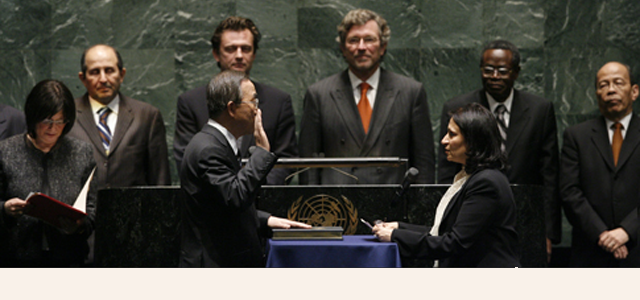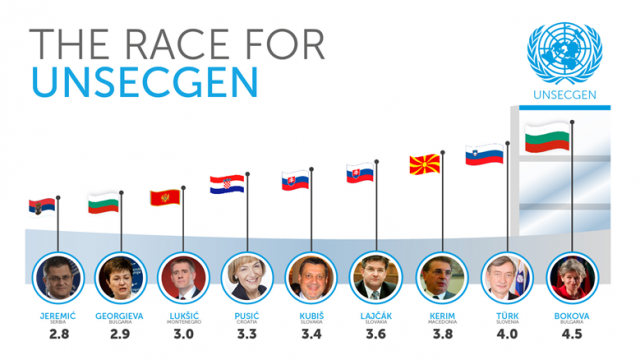Non-stop campaigning. Candidate appearances. States debating how to pick the nominees.
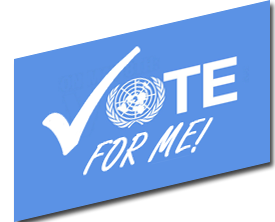 Political nerds are drooling about the next 15 months. The incumbent is finishing up his second term and citizens’ groups are already arguing over candidates’ gender and national origins. It seems that picking the next UN Secretary-General will be almost as exciting as choosing between Hillary, Ted or Marco. (“Polo!”)
Political nerds are drooling about the next 15 months. The incumbent is finishing up his second term and citizens’ groups are already arguing over candidates’ gender and national origins. It seems that picking the next UN Secretary-General will be almost as exciting as choosing between Hillary, Ted or Marco. (“Polo!”)
Yes, we’re talking about the top post at the UN, not the U.S. presidential race. You’re welcome.
All the hubbub about the SG race this year is, I suppose, the price we pay for a more transparent and inclusive process. A few guidelines put in place here, a few straw polls there, and suddenly you have a real process. We asked for it.
So, how exactly does one run for UN Secretary General? Glad you asked.
Step #1: Get support from a UN member state (not necessarily your own)
The Secretary-General is appointed by the General Assembly upon nomination by the Security Council. But it was only in 1996 that it became codified that candidates could have their name put forward by any UN member state, and it didn’t even have to be their own. (Thank you, Mr. Wisnumurti!) You don’t even need to meet any real criteria as there are not any, except in the minds of idealistic civil society groups.
Whichever state backs your candidacy should send a note (on official letterhead, of course) and what qualifications you do have for the job to the President of the Security Council. At the moment, that is Mr. Dato’ Ramlan Ibrahim of Malaysia. If you wait until next month, address it to Mr. Gerard van Bohemen of New Zealand. In August, it should go to Ambassador Uche Joy Ogwu of Nigeria. After that, …. yes, the post changes every month.
If writing to the Council President intimidates you–and don’t we all feel that way at times?–your government can instead consult with the President of the General Assembly, who’ll pass it along. This option has been available since the adoption of Resolution 51/241 in 1997.
Step #2: Be a woman from Eastern Europe.
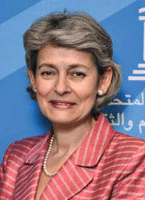
The eight Secretaries General to date have all been men. Statistically speaking, you’d think your chances would improve if you were, too. But there is growing sentiment that it’s time a woman to take charge, particularly if she’s from Eastern Europe. I guess Vaira Vīķe-Freiberga of Latvia left an impression. She was the first female candidate who publicly campaigned for the post. But she was ahead of her time, competing in 2006 against a number of Asian males. This year Vaira is out, but several advocacy groups have put together “binders full of women” candidates who are more than qualified. Better yet, there is a “Group of Friends” among UN members who have met to discuss how to make this happen.
The narrowing of candidates to Eastern Europe has been a long time coming. No one from there has held the post in 70 years, and there is a growing sense that it’s time. So you have a shot – even if you have to face down Vitaly Churkin to get the job. He’s not keen on women candidates, either.
Step #3: Get your name on the “short list”
If you haven’t already, get your campaign plans together now. It’s expected that several nominees will confirm their candidacies in mid-September, using the opening of the 70th General Assembly to launch their campaigns. You’ll need to be prepared to do the same.
Being late to the game, however, is not the end of the world. By “short list” we actually mean everyone who is nominated. Other multilateral races may require those with the fewest votes to drop out in each round, but that’s not how we do things in this contest. As an aspiring Secretary General, you’ll be in to the end. But several states are pushing for the “short list” to be the final list–meaning a deadline for nominations. The Security Council hasn’t agreed to this yet—the U.S. is openly opposed to it—but better safe than sorry. So don’t dally.
Step #4: Be social.
“This used to be a job for which people didn’t have to campaign.” Well, as Shashi Tharoor and others learned in 2006, that’s no longer the case. So hire that travel coordinator and hit the road. There are at least fifteen cities I can guarantee need to be on your itinerary. Meet with a few civil society groups. Learn a little French. Be prepared to shake hands, kiss babies and make deals. (Be careful on this last point; the current SG raised some eyebrows on this in 2006.)
Before announcing, get your website domain. (All. The. Domains. Even the .org’s.) You’ll need a site to post your campaign platform for all those other 170+ countries which you… um, can’t get to. Get a Facebook page and a Twitter account. While you’re at it, get on Instagram and Youtube. All the cool kids are doing it, so I hear.
Step#5: Schmooze
Some states are getting fed up being side-lined by the Security Council members hogging all the attention from candidates. They want to know what you will do for them, too. A few are even calling for formal hearings from candidates at the General Assembly. In 2009, the UN’s Joint Inspection Unit described how other UN agencies (WHO, FAO, IMO… where they do elections right) find these “useful and best practice” and even as far as to suggest such hearings would be “suitable for the election of the Secretary-General.”
It’s not certain if “formal hearings” will happen, but candidates in 2006 did make it a point to schmooze with non-Security Council members. Many met with regional groups or attend various summits taking place to lobby for support among non-Security Council members. (These are like primaries in U.S. electoral politics.) So besure your travel agent has these on your calendar as well.
Step #6: Find nine friends (including five “permanent” ones)
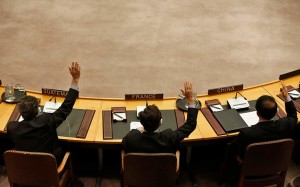 There are 15 Security Council members, five of whom can veto your candidacy if they don’t like you. When they believe there are enough candidates – or if they agree to a deadline for nominations – they’ll conduct a few straw polls. Yes, the world’s top powers pick the UN leader by straw poll. That’s the high-stakes game of global leadership selection, kids. At least the permanent members played nicely last time by voting with the same ballot as those other members (up until the last one).
There are 15 Security Council members, five of whom can veto your candidacy if they don’t like you. When they believe there are enough candidates – or if they agree to a deadline for nominations – they’ll conduct a few straw polls. Yes, the world’s top powers pick the UN leader by straw poll. That’s the high-stakes game of global leadership selection, kids. At least the permanent members played nicely last time by voting with the same ballot as those other members (up until the last one).
Some members will “encourage” you to keep running, others will “discourage” you, and some just won’t care. There won’t be a magic number that moves you to the next round, but it is better to be above water when the votes come in. If you’re already being discouraged by a majority of the Council, that’s going to be hard to come back from.
(A tip for our Eastern European candidates: Go ahead and write off Ukraine’s vote. If they like you, the Russians probably don’t. And Russia’s vote counts more. No, it’s not fair. Crimea river.)
Step #7: Kill any possible challengers
No, not literally. But you should push back, diplomatically, on calls for the Security Council to nominate multiple candidates for the General Assembly. Adopt the motto of the Immortals from Highlander : “..there can be only ONE.”
Remind governments pressing for multiple nominees that it is important the General Assembly vote unanimously– or better yet, vote by acclamation– for the eventual office-holder. If the Assembly is split, even by the tiniest margin, your entire mandate could be suspect. You should be able to convince your regional group of this easily, as they don’t want to appear divided and possibly hand the job to some upstart candidate from elsewhere.
(Okay, yes, the rest of us would like to see multiple nominees and a real choice for the Assembly to make, but as a candidate, you should nip that in the bud quickly. All your challengers will be trying to, um… eliminate you as a co-nominee as well, so don’t worry. But watch your back.)
Step #8: Smile, accept the applause, and take your oath
Eventually the Security Council will stop playing games and move to a color-coded straw poll that differentiates between veto-wielding permanent members and the rest. You want to be the only candidate that no permanent member “discourages” from staying in the race. Even one such ballot will suffice for all your challengers. As soon as that happens, they will know the score and graciously bow out, leaving you the sole possible nominee when the actual vote happens.
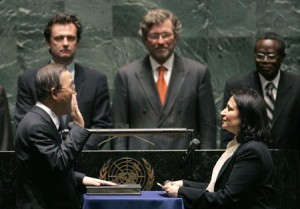
The President of the Council will inform the President of the Assembly that the Council has agreed on a single nominee–you. A few countries will praise your qualities while grumbling and complain about democracy and fairness. A few days later, they’ll vote you into office by acclamation. You’ll graciously accept this great honor, place your hand atop the UN Charter and take the oath of office. Come January 1, 2017, you’ll be the ninth and latest Secretary-General of the United Nations.
Congratulations, and in the immortal words of Q (Trek, not Bond),
“May whatever gods you believe in have mercy on your soul.”
* The following countries will be on the UN Security Council in September/October 2016. Be sure your travel coordinator books you to visit their capitals on your campaign tour: Uruguay, Angola, China, Egypt, France, Japan, Malaysia, Russia, Senegal, Spain, Ukraine, United Kingdom, United States, and Venezuela.

